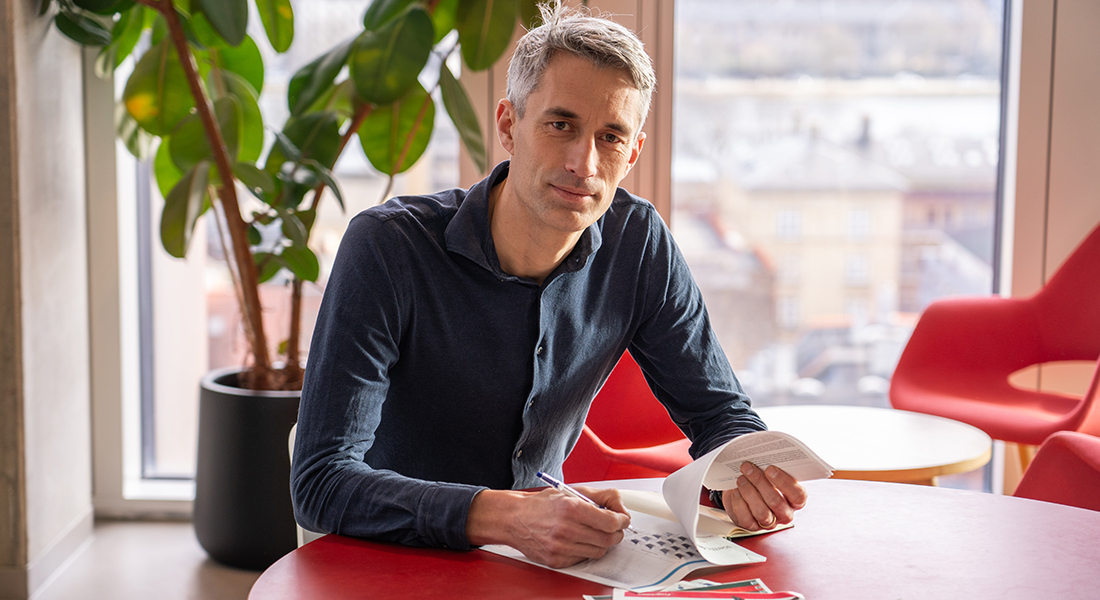Tune H Pers receives award for outstanding research on obesity and diabetes
Do you think that people with obesity have themselves to blame? Associate Professor Tune H Pers tries to dispel persistent myths through his research on the brain's role in the development of obesity. He is now awarded the Leif C. Groop award for his research on obesity and type 2 diabetes.

Associate Professor Tune H Pers receives the Leif C. Groop Award for Outstanding Diabetes Research in 2024 for research that has increased the understanding of how specific brain areas and cell populations regulate glycemic control, energy homeostasis, and genetic predisposition to obesity. His groundbreaking research combines genetic data, single-cell technologies and machine learning and could lead to new treatments for patients with obesity or type 2 diabetes.
The Leif C. Groop Award for Outstanding Diabetes Research is awarded annually by Lund University Diabetes Centre for outstanding research that will benefit patients suffering from diabetes. This year's recipient Tune H Pers investigates, among other things, the role of the brain for the development of obesity, a condition that increases the risk of type 2 diabetes.
"Leif Groop’s data-driven approach to metabolic research has inspired me throughout my career, so I am very honored to receive this award. Many people are still of the opinion that people with obesity have themselves to blame and this can affect the self-esteem of those who are overweight. We shouldn’t underestimate the importance of a healthy lifestyle, but a growing evidence base suggests that obesity is more complex than we previously thought," says Tune H Pers, Associate Professor oat CBMR.
The ability to control eating
He is convinced that we will find some of the answers to the question of what causes obesity by studying mechanisms in the brain. The brainstem is an area of the brain that connects the brain hemispheres to the spinal cord and is home to a part of the vagus nerve that is known to regulate the energy balance in the body. In a study published in Nature Metabolism, Tune H Pers and his colleagues identified several cell populations in this part of the brainstem that control the energy balance of mice. The researchers found that four of those cell populations were associated with genetic obesity predisposition.
"We also showed that two of those populations were of particular importance for the ability to control eating. When we activated two of those cell populations, mice with a predisposition to obesity reduced their eating. It will be important to learn more about those processes to develop new new treatments for obesity," says Tune H Pers.
The role of the brain in type 2 diabetes
The role of the brain in type 2 diabetes is a relatively unexplored area. It is known that the nervous system affects the metabolism and the release of insulin and glucagon. The hypothalamus is a region of the brain that has been shown to have a strong connection to those processes. Previous research has shown that mice with high blood sugar levels can be cured from their diabetes after an injection of a growth-stimulating protein into this part of the brain. In a study published in Nature Communications, Tune H Pers showed that sustained diabetes remission is dependent on specific receptor signaling in the brain.
"Standard antidiabetic drugs can be effective but fail to deliver adequate glycemic control to many patients. We need to learn more about the role of the brain to develop better drugs," says Tune H Pers, who leads a research group at the Novo Nordisk Foundation Center for Basic Metabolic Research at the University of Copenhagen.
Standing on the shoulders of giants
Tune H Pers is a computational biologist and combines genetic data with single-cell technology and machine learning in his research. He became interested in single-cell technology when he was a postdoctoral fellow at the Broad Institute in the United States. Single-cell technology is used to investigate disease mechanisms at cellular level to gain a better understanding of how diseases develop and to develop more precise treatments.
"The Broad Institute was an early adopter of this technology and I brought knowledge back to the University of Copenhagen where my research group has used the technology for several studies. We need to be quick to adopt new technologies and ways of working, as I believe that we see further when we are standing on the shoulders of giants," says Tune H Pers.
